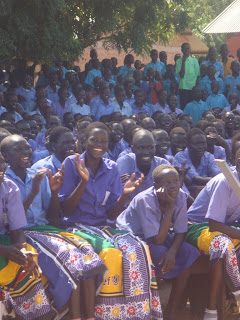Saturday night, 15th October 2011: knackered.
Global Handwashing Day is over, thank goodness. It was a long day, and a
frustrating one, but in the end the event turned out well and I think we held
one of the more successful events around the country. Go Lakes!
Together with local organisation RUWASSA and some very
limited input from other organisations, and almost counter-productive input
from local authorities, we coordinated Global Handwashing Day celebrations here
in Rumbek. From the outset time was against us. While our team had approached
the government some months before the big day there had been no movement until
ten days before, when the Lakes WASH Cluster group met. It was my first
meeting; I was thrown into the co-chairing of this meeting with Oxfam GB as
lead WASH agency and came to the rapid realisation that in this role it was
basically up to us and RUWASSA to get this thing happening.
So, a number of often painfully slow and unproductive
meetings later, and some spoon-feeding of the authorities (even down to writing
of invitations for them to deliver to the important people that would do
speeches), we put our heads together and came up with a plan. Hold the
celebrations at a local school, Riak Dor Primary School, invite the 11 other
schools to participate with 200 of their students, get some of them to come up
with songs and drama to perform in front of everyone, and get some
representatives of the Depts of Health, Education and Rural Water to give some
speeches about the importance of handwashing. Get a company in Nairobi to print
t-shirts and banners which we give out to the schools or put up before the big
day. Give kids a bunch of buckets and jerry cans to set up hand washing
stations around the school. Use the local radio and tv stations to promote the
event and put out hygiene messages, and cover it on the day. Get the local
bottling companies to donate water for our esteemed government guests. Then get
everyone washing their hands by the end. Sound simple enough? Ha! Not in South
Sudan, and not with only ten days to spare – especially when our government
friends want to make everything as slow as possible. Yes our t-shirts should
have every single possible logo on them, but we’re not contributing anything financially
to the day. You’re NGOs, you’ve got money, you should pay for it. And No, we
don’t have the most up to date logo, but you can’t use that one on there, it’s
out of date.
On the day, I must admit I was a little bit too
enthusiastic. I got our public health promoters to turn up with me at around 7:45am. It wasn't that early, considering things were supposed to kick off
at 8:30am with the first speech. But of course, I should have known that
Africa Time would intervene. No-one was there when we arrived to put out all
the chairs, except for the deputy principal, who was a bit more organised than many of his counterparts. In fact, only a few schools had
arrived by 9:00am. The sound system, organised by the Dept of Information, only arrived on the
back of a ute at around 10am. Timely! And none of the dignitaries, bar the Director General (D-G) of
Education and the Minister for Physical Infrastructure, bothered to turn up.
So, around 10:30am, when most of the schools had finally arrived
and everything was in place, we kicked off proceedings. I was actually glad
that only two of them came. It meant only one hour of boring speeches rather
than two. These guys like to talk! And my speech went twice as long as usual,
as it had to be translated into Dinka.
But once that was out the way, the fun
stuff began. The D-G was keen to be the first one to wash his hands and he
hammed it up to the crowd, firstly serious with the hand washing part but then
graduating to a full face wash, including his bushy beard, which the kids
thought was hilarious.
Five schools performed something: whether it be a drama, a
song, a dance, or a hand washing demonstration, the kids did what comes
naturally. We got a sneak preview before the day started, as the chosen
performers warmed up for their big performance, but watching them against a
backdrop of hundreds of dark faces with blazing white smiles and equally bright
uniforms was something else. They were great.
What I liked most was seeing each school arrive from
somewhere off in the distance, their chanting songs preceeding them together
with the deep sound of their drums, their bright blue or green uniforms blazing
in the sun, their almost perfect marching unison characterised by swinging
arms, the lead children brandishing UNICEF banners or messages they’ve composed
themselves. I loved the way they marched around and across the school compound
before finally setting up their place amongst the other students underneath the
old frangipani trees. And even at a young age, girls here certainly know how to
make some noise! I’ve quickly learned what ULULATING means. I normally
associate it with middle-eastern women, but South Sudanese women certainly have
a talent for it!
It was a long, hot day for the kids, especially the ones who
had turned up early. At least they got the first-in, best-dressed benefit of
the shade of the frangipani trees. The others had to slog it out in the hot
sun. Once the DG and the Minister closed the day with more too much talking,
everyone split quick-smart, leaving behind a school playground soggy with
handwashing water, soap and the remnants of a crowd once there. So we packed
our bags and went out for a rewarding Ethiopian lunch – and then home to
recover.







No comments:
Post a Comment